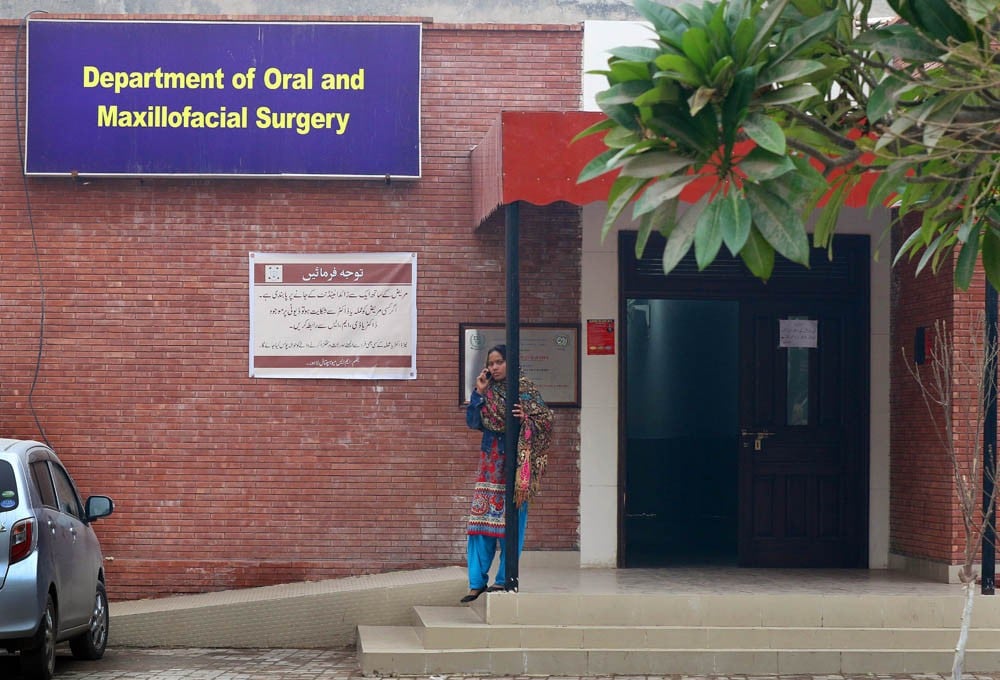
Being the busiest public sector facility, Mayo Hospital’s Oral and Maxillofacial Surgery Department has to often put patients on the waiting list, sometimes for three years

Sialkot-based Advocate Muhammad Ayub had a road accident last year, in which his jaw was hit so hard that it got fractured. He was rushed to a private hospital where he was told that the facial surgery would cost him around Rs100,000.
"I couldn’t afford that amount," he tells TNS. "So I came down to Lahore’s Mayo [Hospital] where the doctors fixed my jaw free of cost. For three months, I wasn’t allowed to eat anything that was hard to chew. Mercifully, I am now as normal as anyone else going around."
Ayub is talking about his treatment at Mayo Hospital’s Oral and Maxillofacial Surgery Department (OMSD), the only one of its kind not just in the city but in the entire continent of Asia. No wonder it receives patients from other parts of the country and also from India and Afghanistan.
Gulsher, who is over from Peshawar, lost his left eye in the course of a facial surgery in his home town. "I am happy I came to Mayo. I got a new lease of life," he says. "And, it didn’t cost me a penny to get a part of my face and eye reconstructed."
To quote Senior Registrar, OMSD, Mayo Hospital, the department treats "oral (related to mouth) and maxillofacial (related to jaw and face) diseases, injuries, fractures and defects. Nasal, skull and eye socket fractures are also treated here. "The maxillofacial surgeons require training in dentistry, surgery, and general medicine. They may also choose to undergo further training in head and neck cancer reconstruction, cosmetic facial surgery, craniofacial surgery, cleft surgery, maxillofacial trauma, and reformation of the facial region."
Being the only public sector facility also means the department is the busiest. A patient sitting outside a room in Mayo’s OMSD says he managed to get the date for surgery after waiting for almost two months.
There is a need to set up oral and maxillofacial surgery units in hospitals all over the country. Professor Riaz Ahmed Warraich, the founder of the department at Mayo and the first Pakistani surgeon to be working on RAS gene analysis, admits that there are "limited resources and arrangements [at Mayo’s OMSD] to cater for the increasing number of patients.
"Around 150 patients visit our OPD every day. Out of these, 50 percent are those who require surgical treatment. But, on an average, only 16 operations are conducted in a week’s time, which means the rest of the patients are put on the waiting list."
The waiting list, says Prof Warraich, who is a senior oncologist, may last "up to three years, particularly for mouth cancer patients!"
Talking about the history of the department, he says, "We built it from scratch in the year 1998. Initially, we had only two beds. By 2000, the College of Physician and Surgeon, Pakistan had approved the department and postgraduate students were inducted. As a result, the number of beds was increased to 12.
"There was no building for the department at that time," he recalls. "We offered beds in different wards. Later, an abandoned structure was converted into a 22-bed room which has now been upgraded. Finally, we have 50 beds, an ICU, an OT [operation theatre] and some well-trained doctors. We are hoping that the waiting list period would be reduced to two years maximum."
The renovated department has an operation theatre with two tables on which the patients suffering from jaw fractures are operated, whereas those suffering from mouth cancers shall continue to be operated at the old OT.
The department is run by a professor, an assistant professor, two associate professors, eight medical officers, 25 postgraduate students, four HO and four demonstrators. The department was renovated at a cost of Rs30.5 million, funded by the UNHCR.
It is not just casualties from road accidents or fist fights that fill the department’s ward. "Cases of mouth cancer are on the increase in Pakistan," Prof Warraich claims. "That makes setting up more oral and maxillofacial surgery departments all the more necessary."
To this effect, the government is supposed to have formed a committee that announced starting the said units at all the teaching hospitals of Lahore. It is learnt that a two-bed maxillofacial surgery unit has been set up at Jinnah Hospital recently. Punjab Dental Hospital has also got one such facility.
"Actually, oral cancer treatment is very costly," Prof Warraich adds. "A single surgery costs Rs1 million. If ten operations are conducted in a month, it totals to Rs500 million against 120 operations in a year."